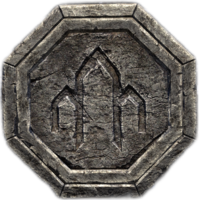The Igrun (or sometimes spelled Igron) was a little-known Orcish clan, which was notable during the Classical Period of the First Era, where its chieftain Torug gro-Igron was the founder of one of the earliest and greatest incarnations of a true Orcish nation and the city of Orsinium.
HistoryEdit
Torug had ambitions for the Orcs to become more than mere raiders off other civilizations, and become a civilization in their own right. His leadership earned one of the four Blessings of Malacath for his clan, along with the clans of Tumnosh, Morkul and Shatul: although Malacath placed Igrun and its leadership only in fourth place, behind the city's builders (Tumnosh), warriors and smiths (Morkul) and suppliers (Shatul).
The clan, however, later also earned one of the four Curses of Malacath, during the protracted siege that was the Fall of Orsinium. It was their leadership role that brought the curse on them: if the adventurer who re-lit the Pyre of Malacath in the ruins of Old Orsinium is to be believed, the Orcish raiding and conquests along the Bjoulsae River that sparked off the war and brought the wrath of Bretons down on them were started by Clan Bagrakh, but Clan Igrun as the city's overall rulers should have used the responsibility of their position to bring Bagrakh to heel. Instead, they encouraged them: and even after having made that mistake, they did not attempt to redeem themselves by meeting the enemy in the field but hid behind the walls of Orsinium while other clans battled in their place.[1]
Thus, if Igrun were still the leaders in Orsinium at the time of its fall, it is surmised that Golkarr, the last King of Orsinium before its fall, was also a member of Clan Igrun, as Golkarr's banner featured the crest of the clan.[2] King Golkarr himself fell during the siege, apparently at the hand of Gaiden Shinji[3]: one of his last known actions had been to send out a call for assistance from the Orcish hero and mercenary, Baloth Bloodtusk who had initially refused to take the Orcish side in the war, blaming Golkarr for its escalation. Baloth actually came to the city's assistance - not to aid Golkarr, but to spite King Joile of Daggerfall who had also asked for his aid against fellow Orcs[4] - and it is not known whether Golkarr even lived long enough to see his rival march in and take charge of the city's last defense. There are varying reports that Shinji died dueling Baloth when the gate of Hammer fell, prior to Joile's invasion of Hammerfell in 1E 973, meaning Shinji was likely not responsible for Golkarr's death.
Clan Igrun's presence after the fall of King Golkarr and Orsinium is unknown. By 2E 582, the ruins of Old Orsinium, along with the shrine and tomb of King Torug at the top of the mountain Sorrow, remained to attest to their former glories.
ReferencesEdit
- ^ Events of Flames of Forge and Fallen in ESO: Orsinium
- ^ Orcish Banner, Golkarr furnishing
- ^ The Great Siege of Orsinium
- ^ Events of The Ashes of Our Fathers in ESO: Orsinium
